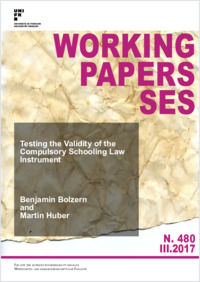Testing the validity of the compulsory schooling law instrument
BP2-STS
-
02.03.2017
6
English
Changes in compulsory schooling laws have been proposed as an instrument for the endogenous choice of schooling. It has been argued that raising minimum schooling exogenously increases the educational attainment of a subset of pupils without directly affecting later life outcomes such as income or health. Using the method of Huber and Mellace (2015) and data from the Survey of Health, Ageing and Retirement in Europe, we jointly test random instrument assignment, weak monotonicity of education in the instrument, and the instrument exclusion restriction. The satisfaction of these restrictions permits identifying the local average treatment effect of education on those choosing more schooling as a reaction to the law change. Our results do not point to the invalidity of the schooling law instrument, though we acknowledge that even asymptotically, testing cannot detect all possible violations of instrument validity.
- Collections
- Faculty
- Faculté des sciences économiques et sociales et du management
- Language
-
- English
- Classification
- Economics
- Series statement
-
- Working Papers SES ; 480
- License
-
License undefined
- Identifiers
-
- RERO DOC 279079
- RERO R008606896
- Persistent URL
- https://folia.unifr.ch/unifr/documents/305265
Statistics
Document views: 199
File downloads:
- Document: 299
